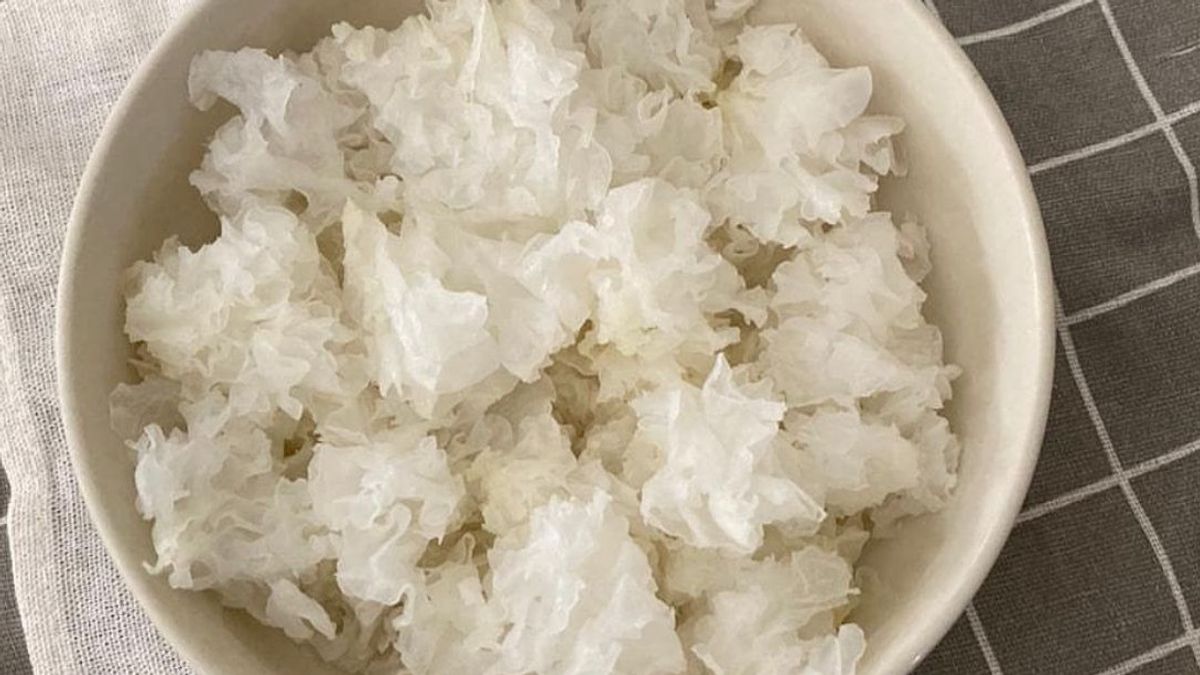JAKARTA - Recently, snow fungus has become a viral culinary and many people want to give it a try. The snowfall has gone viral from food vloggers who make content eat snow mushrooms with Thai sauce.
Food vloggers say snow mushrooms mixed with Thai sauce taste so good. Plus, the snow fungus texture is chewy when eaten.
What are snow mushrooms?
Snowfall or known as the scientific name Tremella fuciformist. Snowfall is included in the Tremella family and can be eaten. These mushrooms grow on the skin and branches of trees, especially on wide leafy trees.
These mushrooms have been used in traditional Chinese medicine for centuries. Currently, these mushrooms are still popular because they are used as a treatment, including anti-inflammatory and antioxidant effects.
Snowfish have their characteristics, because they are generally found attached to fallen wide leafy tree branches. These mushrooms are white to pale yellow, have soft textures such as blues that almost penetrate light, and resemble underwater corals.
Snowfall generally grows in Asia, but is also found in tropical climates around the world, including South and Central America, Australia, New Zealand, and the Pacific Islands. Snowfall is used as a medicinal ingredient in China's treatment for years to improve health and longevity.
Benefits
Overall, snow mushrooms tend to be low in calories and provide a little protein and fiber. Adding fiber to food can help reduce the risk of developing heart disease, diabetes, obesity, and gastrointestinal disease.
The mushrooms also provide a little vitamin D, zinc, calcium, and folate, each of which plays an important role in immunity, bone health, and brain development.
Snowfall is considered to have many health benefits, most of which are caused by the content of the carbohydrate chain known as polysakaride. Here are the benefits of consuming snow mushrooms:
Inflammatory is a natural way for the body to respond to injury and support the healing process. Inflammatory is usually lost after the wound is healed. However, if the body is constantly inflammatory, it is called chronic inflammation. This is related to an increased risk of heart disease and cancer.
chronic inflammation is also associated with increased levels of pro-inflammatory markers such as nitric oxide, interleukin-1 beta, interleukin-6, and tumor-alpha necrosis factors.
A study shows that snow mold extracts have anti-inflammatory activity capable of lowering the pro-inflammatory marker.
If the body is exposed to too many free radicals, it can cause oxidative stress, which can cause negative health effects such as cell and tissue damage.
Antioxidants are molecules that help neutralize free radicals, thereby protecting the body from oxidative stress. In addition, snow fungus polysocirides can reduce oxidative stress by fighting free radicals. This can help protect you from certain chronic conditions.
Snow fungus polyakarides can protect brain cells from damage to nerve cells and degenerative diseases. One study found white fungus extract can reduce brain toxicity caused by beta-amiloids, a high amount of protein that has been associated with the development of Alzheimer's disease.
Research has also shown that these extracts can increase memory. One 8-week study in 75 people found consuming 600 mg or 1,200 mg of white fungus supplements per day increased the number of memory questionnaires, especially in short-term memory parameters compared to control groups.
Similarly, one study showed daily oral treatment with snow fungus extract significantly reversed memory loss caused by drugs.
Bioactive compounds in snow mushrooms can stimulate several immune system defense cells. One study concluded that proteins found in snow mushrooms can stimulate macrophage activity, a type of white blood cell that kills bacteria and remove damaged tissue.
Other studies show the polysacarchy can help regulate the immune response and reduce deaths from infection in laboratories.
Snowfall is popular in the beauty industry due to its anti-aging and moisturizing properties. The polysakaride can increase skin hydration by reducing water loss and collagen in the skin after exposure to sunlight or ultraviolet light.
What's more, the snow fungus polysakaride forms a transparent layer that increases the water's retention when coated on the skin. Thus, this can act as a natural moisturizer and anti-ut agents.
SEE ALSO:
The snow fungus polyakaride can help lower blood sugar levels by acting on several antidiabetic pathways.
One study showed that snow fungus polysakarides can significantly lower blood sugar levels and increase insulin sensitivity, which is a way for cells to respond to insulin hormones.
In addition, reaction tube research found snow mold extracts could positively affect enzymes and hormones related to diabetes.
Research shows snow mold can inhibit the activity of aldosa reductase. This increase in enzyme levels can cause eye and nerve damage to diabetics.
Other studies suggest that snow fungus polysacarchides can normalize resistant and adiponectin levels, two hormones that can lead to insulin resistance.
Compounds in snow mushrooms can protect heart disease. One study shows that fungal antioxidant activity can prevent oxidized LDL cholesterol (bad).
Evidence suggests that LDL oxidation is involved in the initiation and development of atherosclerosis, a buildup of plaques in arteries that are considered a risk factor for high blood pressure and stroke.
The English, Chinese, Japanese, Arabic, and French versions are automatically generated by the AI. So there may still be inaccuracies in translating, please always see Indonesian as our main language. (system supported by DigitalSiber.id)


















